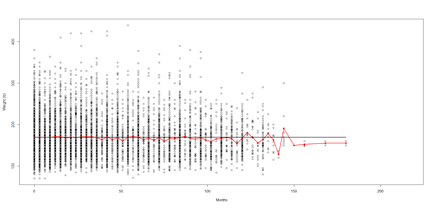Session Information
Session Type: ACR Poster Session C
Session Time: 9:00AM-11:00AM
Background/Purpose:
Inflammatory arthritis (IA) is a chronic disorder that encompasses rheumatoid and psoriatic arthritis. Rheumatoid cachexia is defined as elevated HDL, increased adiposity, and loss of lean muscle mass and affects up to two thirds of patients with IA. This can result in extremes of weight and is associated with higher disease activity, elevated rate of cardiovascular disease, and increased sedentary behavior.
Conflicting evidence exists around weight change associated with biologic Disease Modifying Antirheumatic Drugs (boDMARDs). This study sought to examine if weight or body mass index is correlated with treatment with a boDMARD in patients with inflammatory arthritis. Secondary objectives examined disease activity as a function of weight change.
Methods:
This study was a retrospective analysis of 2228 patients with IA enrolled in the Rheumatoid Arthritis Pharmacovigilance Program and Outcomes Research in Therapeutics (RAPPORT) Database. This database is a cohort of patients with Inflammatory Arthritis in Northern Alberta that captures demographic information including weight at baseline, 1 month, 3 months, 6 months, and subsequently yearly.
Weight in pounds, body mass index (BMI), and DAS 28 were tracked over time in months using a mixed effect model with subject specific random effects.
Results:
There was a small but statistically significant increase in weight (0.02 lbs, 95% CI 0.018-0.03 p<0.001) and BMI (0.006lbs, p<0.001) over time in months. There was also a negative association between DAS 28 and increased weight (-0.56, p<0.001) as well as BMI (-0.08, p<0.001) suggesting an increase in weight was associated with lower disease activity.
Conclusion:
Extremes of weight and BMI have previously been shown to be a risk factor for poor long-term outcomes in patients with IA. This study suggests that patients with inflammatory arthritis on boDMARDs tend to gain weight over time, in keeping with previous studies examining the effects of TNFi on weight. This may be reflective of improved disease control given the negative association between increased weight/BMI and decreased DAS 28. Alternately, it may suggest weight stabilization as by comparison, the average Canadian gains approximately 0.25-0.5lbs/year.
Figures:
Figure 1: Weight (lbs) trend over time after initiation of biologics. Number of patients: 2298. Total visits: 16642.
To cite this abstract in AMA style:
Jones B, Hassan I, Maksymowych WP, Yacyshyn E. Association between Biologic Dmards and Weight Change in Patients with Inflammatory Arthritis [abstract]. Arthritis Rheumatol. 2018; 70 (suppl 9). https://acrabstracts.org/abstract/association-between-biologic-dmards-and-weight-change-in-patients-with-inflammatory-arthritis/. Accessed .« Back to 2018 ACR/ARHP Annual Meeting
ACR Meeting Abstracts - https://acrabstracts.org/abstract/association-between-biologic-dmards-and-weight-change-in-patients-with-inflammatory-arthritis/

